The best greens powder for bloating, which ones are worth taking to promote better gut health and learn the benefits of taking them daily!
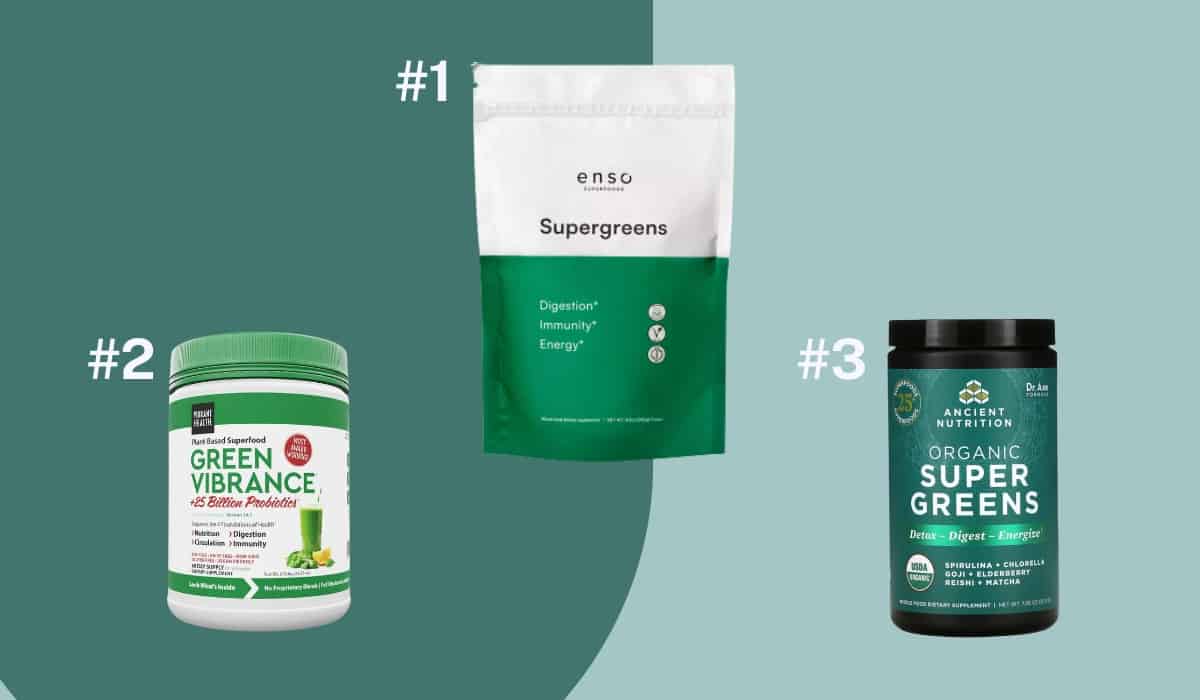
This post was sponsored by The Health Board
Written by Rachel Gargano, MS, RD, CSSD, CBS
Verified by Lena Bakovic, MS, RD, CNSC
If you’ve been searching high and low for the best greens powders for bloating, you’re not alone. It turns out that nearly 40% of the adult population suffers from digestive system issues.
We’re talking bloating, constipation, and irritable bowel syndrome - just to name a few of these uncomfortable GI conditions.
And while the world of greens supplements is relatively new, it turns out that taking green powders for bloating and other painful digestive woes can actually be helpful.
I’m donning my registered dietitian-nutritionist and digging through the top greens supplements to determine the best greens powder for bloating.
The Best Greens Powder for Bloating - Top 3 Picks
- Ensō Supergreens - Best greens powder for bloating
- Vibrant Health Green Vibrance - Runner up
- Ancient Nutrition Organic SuperGreens - Second runner up
Why Take Greens Powder for Bloating?
Bloating can be normal and usually isn't worrisome, but it still can be uncomfortable. Knowing which foods may create an issue for you, and which may help, is an important first step to help eliminate the bothersome GI symptoms.
When it comes to green powders, there are several ingredients that can benefit our gut and help reduce bloating.
The first are certain phytonutrients (plant compounds) that can influence our gut health. For example, plants rich in antioxidants, such as parsley, ginger, and mint work in several ways to help strengthen our beneficial gut microorganisms and protect our gastrointestinal tract.
Next, the addition of probiotics, prebiotics, and digestive enzymes can also help make a greens powder good for bloating and digestive health. These ingredients help us not only digest food better, but also keep our gut microbiome thriving.
So whether it's occasional gas you experience or find bloating a frustrating part of everyday life, adding the right green powder to your daily routine can provide nutrients to help you feel your best and avoid bloating.
The Best Greens Powder for Bloating, Ranked by an Expert
For each of the top greens powders, I’ll be highlighting both beneficial ingredients as well as those that may trigger more unwanted gut issues.
Keep in mind that foods affect everyone differently. For example, some people have a difficult time breaking down certain types of carbohydrates, the acronym for which is FODMAPs.
Some greens powders are high in FODMAPs and may cause bloating. Since more people are noticing their sensitivity to these carbohydrates, I’ve included them in my list for your reference.
#1 Ensō Supergreens
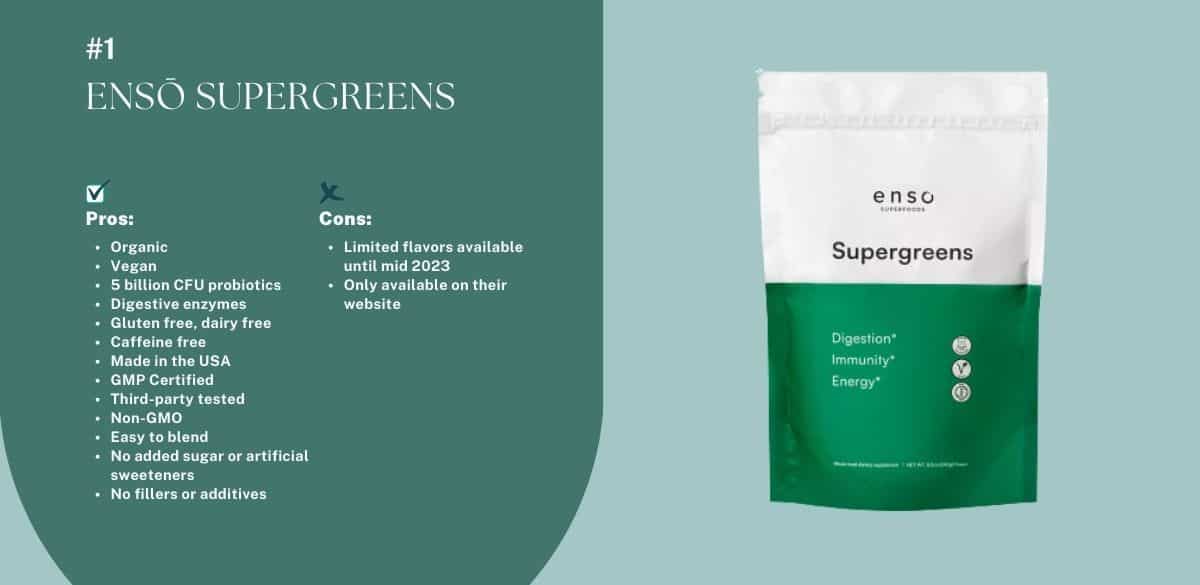
Topping my list as the best greens powder for bloating is Ensō Supergreens. With over 20 nutrient-rich ingredients and bloat-busting properties, this greens supplement is a powerhouse. It also helps support immunity, energy, and metabolism.
Bloat-relieving ingredients
Parsley. This herb helps lessen muscle spasms of the intestines. This is helpful for someone who experiences pain, cramping, and bloating in their gut.
Ginger. When taken consistently, ginger root helps to increase the number and diversity of beneficial bacteria in your intestines. Bolstering your microbiome helps to reduce uncomfortable GI symptoms such as bloating as well as those associated with irritable bowel syndrome (IBS).
Peppermint. This herb has the ability to help reduce abdominal pain, relax the muscles of your intestines, and reduce overall IBS symptoms.
In addition to the above ingredients, Ensō Supergreens also contains 5 billion CFU probiotics as well as digestive enzymes. Probiotics are beneficial living organisms that help to strengthen your microbiome, providing better digestion, less abdominal pain, and enhanced immunity.
Digestive enzymes can help you better break down foods. Ensō Supergreens includes two digestive enzymes that have been found particularly beneficial to digestive health, helping to reduce symptoms such as bloating. These include bromelain from pineapple and papin from papaya.
Ensō Supergreens is also organic and has no caffeine, fillers, preservatives, added sugars, or artificial sweeteners. Studies show that food additives such as these, including pesticides from non-organic foods, contribute to inflammation in the gut, damaging tissue and creating an environment ripe for bloating and abdominal pain.
Tough on the gut
The only ingredient in Ensō Supergreens that may trigger bloating is broccoli. Broccoli is a cruciferous vegetable that contains a difficult-to-digest carbohydrate called fructan.
However, broccoli only becomes a high FODMAP food at 3 cups—well above the amount per serving in this green powder. So, unless you are extremely sensitive to broccoli, Ensō Supergreens may still work wonders for you.
Pros:
- Organic
- Vegan
- 5 billion CFU probiotics
- Digestive enzymes
- Gluten free, dairy free
- Caffeine free
- Made in the USA
- GMP Certified
- Third-party tested
- Non-GMO
- Easy to blend
- No added sugar or artificial sweeteners
- No fillers or additives
Cons:
- Limited flavors available until mid 2023
- Only available on their website
Overall: Ensō Supergreens is the best greens powder for bloating because it contains a plethora of bloat-stopping ingredients, including probiotics and digestive enzymes, while leaving out all those extras that cause problems.
#2 Vibrant Health Green Vibrance
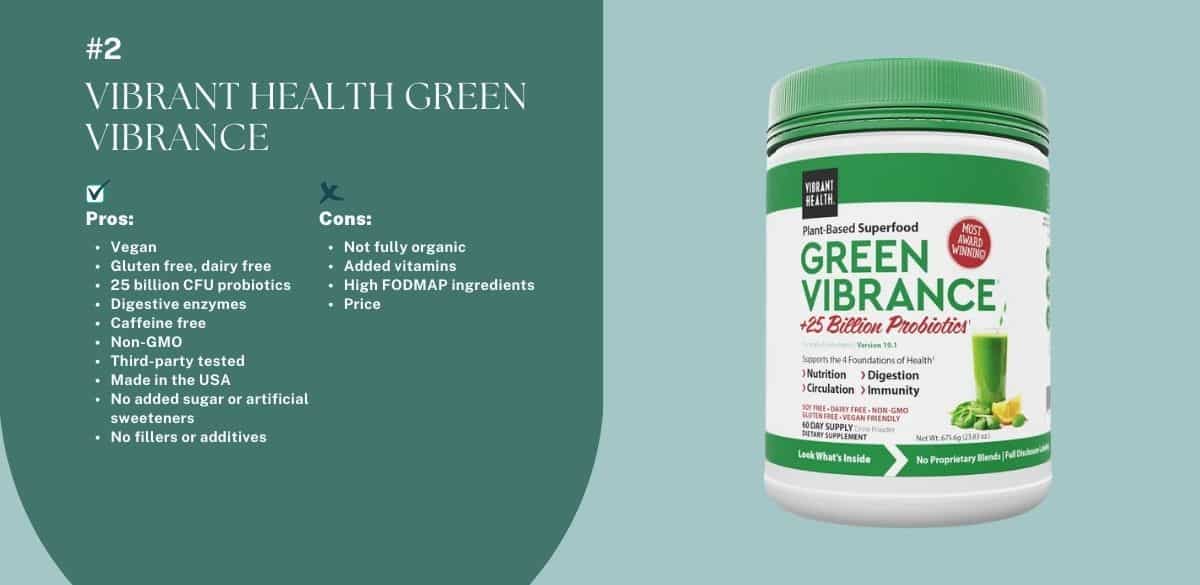
The number two greens powder for bloating is Green Vibrance by Vibrant Health. With several bloat-busting ingredients and a big punch of probiotics, this greens powder may be helpful for GI symptoms. However, there are also some ingredients to watch out for.
Bloat-relieving ingredients
Probiotics. Green Vibrance contains a whopping 25 billion CFUs of probiotics, higher than almost all other greens powders available. Probiotics are incredibly important for maintaining a healthy gut microbiome.
Because of the sheer volume of probiotics in this greens powder, the company recommends you keep the product in the refrigerator or freezer to ensure they do not go bad.
Beetroot. This earthy red vegetable is packed with phytonutrients. Two of these phytonutrients are actually broken down into short-chain fatty acids, an important food for our intestinal cells that keeps them efficiently digesting and absorbing nutrients.
Green Vibrance contains parsley as well as digestive enzymes (though not the ones from pineapple or papaya).
Tough on the gut
While Ensō Supergreens is fully organic, Green Vibrance only has some ingredients that are organic, allowing for inflammatory pesticides and herbicides to be present in the product.
Additionally, if you’re someone who has a tough time with hard-to-digest FODMAP carbohydrates, this product is packed with them: zucchini, broccoli, goji berries, and added fructooligosaccharides (FOS).
Unfortunately, beetroot juice is also a high FODMAP ingredient. If you’re someone with a sensitivity to these ingredients, you may need to find a better product.
Pros
- Vegan
- Gluten free, dairy free
- 25 billion CFU probiotics
- Digestive enzymes
- Caffeine free
- Non-GMO
- Third-party tested
- Made in the USA
- No added sugar or artificial sweeteners
- No fillers or additives
Cons
- Not fully organic
- Added vitamins
- High FODMAP ingredients
- Price
Overall: Green Vibrance is loaded with probiotics and a few other ingredients that help reduce bloating, but it is not fully organic and contains a bunch of high-FODMAP foods. If you are sensitive to these carbohydrates, this greens powder is not for you.
#3 Ancient Nutrition Organic SuperGreens
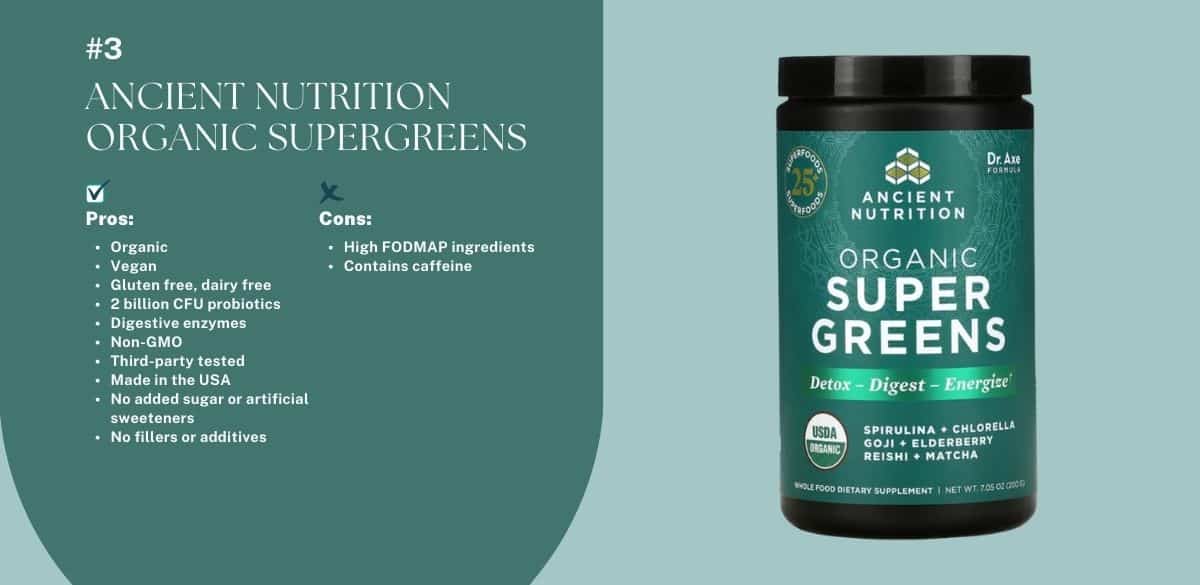
Organic Supergreens by Ancient Nutrition is a fruit and vegetable blend that includes fermented botanicals and mushrooms along with its greens. Its ingredients hold up as a decent greens powder for bloating with just a few caveats. Let’s take a closer look.
Bloat-relieving ingredients
Flax and chia seeds. These two seeds are packed with both soluble and insoluble fiber which help support your gut health as well as help maintain regularity. However, there is only 1 gram of fiber per serving, indicating that neither seed is particularly abundant in this greens powder.
Adaptogenic Mushrooms. Both Reishi and Cordyceps are considered medicinal mushrooms and have been used as such for thousands of years.
These particular mushrooms also provide prebiotic fibers that help fuel the growth and health of our gut microbiome. The healthier our gut and microbes, the less bloating we may experience.
Ancient Nutrition’s Organic SuperGreens is also certified organic, contains peppermint, matcha powder, and ginger; and has 2 billion CFUs of probiotics along with a smattering of digestive enzymes.
Tough on the gut
While Ancient Nutrition’s Organic SuperGreens does have probiotics, the CFUs are on the low side. Plus, if you’re someone who needs to be aware of FODMAPs, this product does contain broccoli, goji, and beetroot.
Additionally, the digestive enzymes used are not those from pineapple or papaya.
Pros
- Organic
- Vegan
- Gluten free, dairy free
- 2 billion CFU probiotics
- Digestive enzymes
- Non-GMO
- Third-party tested
- Made in the USA
- No added sugar or artificial sweeteners
- No fillers or additives
Cons
- High FODMAP ingredients
- Contains caffeine
Overall: While the probiotic CFUs are lower than both Ensō and Vibrant Health, Ancient Nutrition’s Organic SuperGreens has a variety of ingredients that make it a good greens powder for bloating. Just be careful of the FODMAP ingredients if you’re sensitive!
#4 Skipwith Organics Greens Ritual
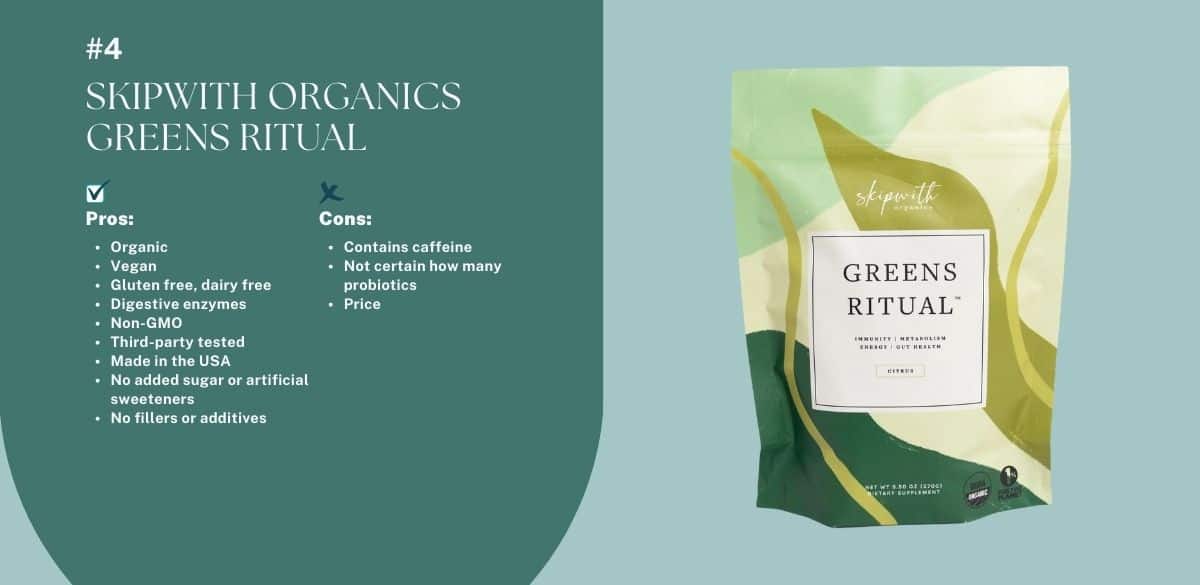
Greens Ritual by Skipwith Organics contains over 20 superfood ingredients and presents as a greens powder to support gut health, anti-aging, energy, immunity, and metabolism. Greens Ritual has a few key ingredients that make it a good greens powder for bloating, along with a couple disappointments.
Bloat-relieving ingredients
Matcha. Matcha powder is ground up green tea leaves with powerful antioxidant effects that have been around for centuries. Recently, studies have indicated that green tea has the ability to enhance the growth of beneficial bacteria in the gut while inhibiting the growth of the bad microbes. These detrimental microbes are often a culprit in bloating and other digestive issues.
Seabuckthorn. This plant is not utilized often in greens powders but does pack a punch when it comes to gut health. Studies indicate this herb may help protect against gastric ulcers, produce short-chain fatty acids that fuel our gut cells, and help boost the number and diversity of our microbiome.
Greens Ritual also contains beetroot and parsley, along with digestive enzymes (bromelain from pineapple), as well as some probiotics. Plus, this greens powder is certified organic, so you won’t get a side of pesticides or herbicides.
Tough on the gut
While the label states probiotics are present, it does not say how many CFUs, so we can’t be sure how many you are actually getting per scoop. Other than the presence of broccoli, this product is low-FODMAP.
And while the product isn’t too tough on the gut, it certainly is tough on the wallet, being one of the most expensive greens powders on the list.
Pros
- Organic
- Vegan
- Gluten free, dairy free
- Digestive enzymes
- Non-GMO
- Third-party tested
- Made in the USA
- No added sugar or artificial sweeteners
- No fillers or additives
Cons
- Contains caffeine
- Not certain how many probiotics
- Price
Overall: If you have deep pockets, and assuming the probiotics are abundant enough, Skipwith Organics’ Green Ritual is a good, clean greens powder for bloating.
#5 Organifi Green Juice
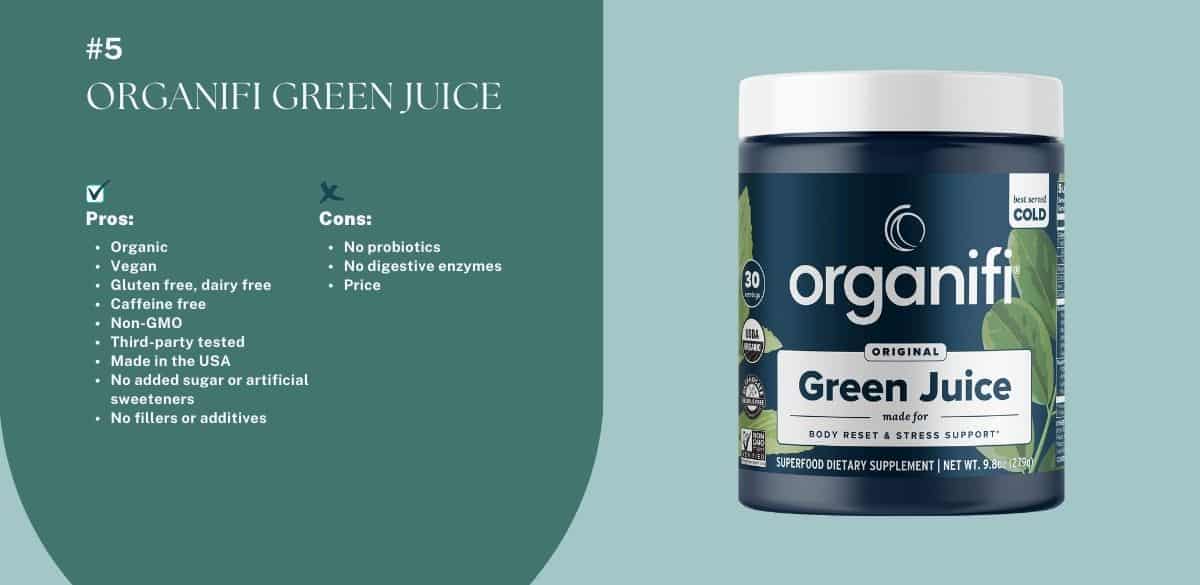
Green Juice by Organifi is a relatively straightforward greens powder with about a dozen superfood ingredients. This is a good greens power for bloating because it contains a few herbs and spices that play an important role in the health of our gut.
Bloat-relieving ingredients
Turmeric. This yellow spice gets most of its power from the compound curcumin. When consumed, curcumin helps your microbiome flourish and reduces harmful, bloat-inducing inflammation.
Lemon. Phytonutrients in lemon have anti-aging effects on your intestinal environment, helping boost your digestive health.
Green Juice is certified organic, so you won’t be getting any harmful pesticides or herbicides.
Tough on the gut
Green juice contains one prebiotic fiber, which helps to feed your beneficial bacteria, but no probiotics or digestive enzymes.
Pros
- Organic
- Vegan
- Gluten free, dairy free
- Caffeine free
- Non-GMO
- Third-party tested
- Made in the USA
- No added sugar or artificial sweeteners
- No fillers or additives
Cons
- No probiotics
- No digestive enzymes
- Price
Overall: Organifi’s Green Juice includes some powerful ingredients in this greens powder for bloating but does not contain the benefits of probiotics or digestive enzymes.
#6 BetterDays BetterGreens
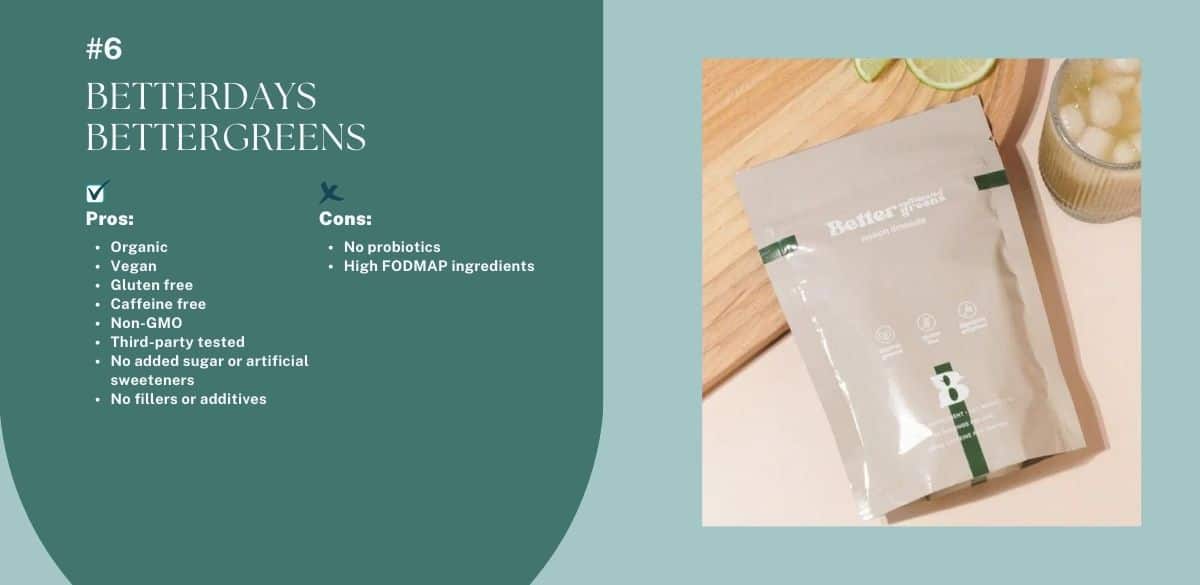
BetterGreens by BetterDays is a lesser-known greens powder, but it does a good job incorporating some ingredients that may boost your gut health and bust the bloat.
Bloat-relieving ingredients
Onion. Say what? Yup, onion. Confession: I haven’t tasted this product yet, so I’m not sure how much of a flavor impact the onion has, but if there is enough of this vegetable present, it can provide prebiotics that stimulate the growth of the healthy bacteria in your gut microbiome.
Cranberry. These vibrant red berries are not only packed with antioxidant power and prebiotics, but also help reduce digestive issues by supporting your good bacteria and reducing the bad.
BetterGreens also contains digestive enzymes, though not those from pineapple or papaya.
Tough on the gut
While onions are a powerful prebiotic, they are also a high FODMAP food that unfortunately causes bloating and gut pain for many people. BetterGreens also contains Brussels sprouts, which are a nutritional powerhouse but also high in FODMAPs when concentrated.
BetterGreens powder does not contain any probiotics.
Pros
- Organic
- Vegan
- Gluten free
- Caffeine free
- Non-GMO
- Third-party tested
- No added sugar or artificial sweeteners
- No fillers or additives
Cons
- No probiotics
- High FODMAP ingredients
Overall: BetterGreens has a few beneficial ingredients, but without probiotics it’s not a well-rounded greens powder for digestive health.
#7 Bloom Greens & Superfoods
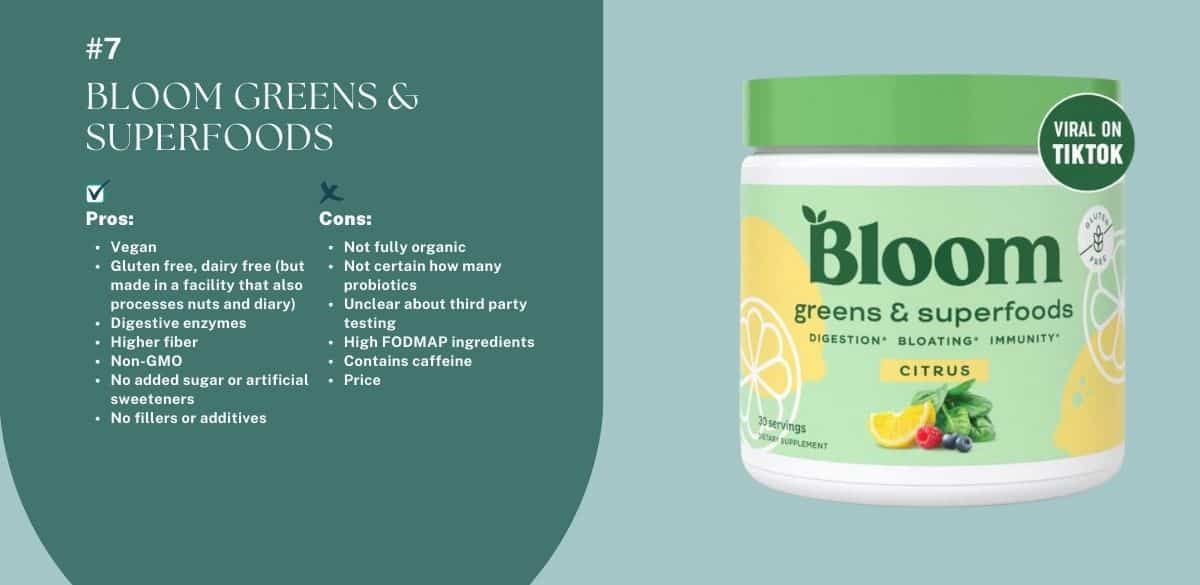
Bloom plays the benefits-gut-health-and-bloating card big time for their product Greens & Superfoods.
Bloat-relieving ingredients
Fiber. With 2 grams of fiber, this greens powder is one of the highest on the list. Their fiber sources include chicory root fructooligosaccharides (FOS), flaxseed, and apple fruit powder. Soluble and insoluble fibers can help reduce bloating by keeping you regular.
Blueberry. Turns out that blueberries contain phytonutrients that are likely to boost the health of our microbial communities.
Licorice. This herb has been shown to be beneficial for the upper GI (stomach and esophagus), helping to reduce symptoms of upset stomach, acid reflux, bloating, and heartburn.
Greens & Superfoods also contains probiotics, digestive enzymes, beetroot, matcha, and ginger.
Tough on the gut
For many people, prebiotics such as those in Greens & Superfoods—chicory root FOS, inulin, and maltodextrin—help keep their gut happy and the bloat down. But for others, prebiotic fibers may cause a lot of issues. With these ingredients in such abundance, you may need to skip this one if your gut issues are triggered by the wrong type of fiber.
Bloom’s product is also not fully organic.
Pros
- Vegan
- Gluten free, dairy free (but made in a facility that also processes nuts and diary)
- Digestive enzymes
- Higher fiber
- Non-GMO
- No added sugar or artificial sweeteners
- No fillers or additives
Cons
- Not fully organic
- Not certain how many probiotics
- Unclear about third party testing
- High FODMAP ingredients
- Contains caffeine
- Price
Overall: If you can tolerate prebiotic fibers well, Bloom’s Greens & Superfoods may fit the bill as a greens powder for bloating. However, steer clear if you react strongly to these ingredients.
#8 Your Super Gut Feeling
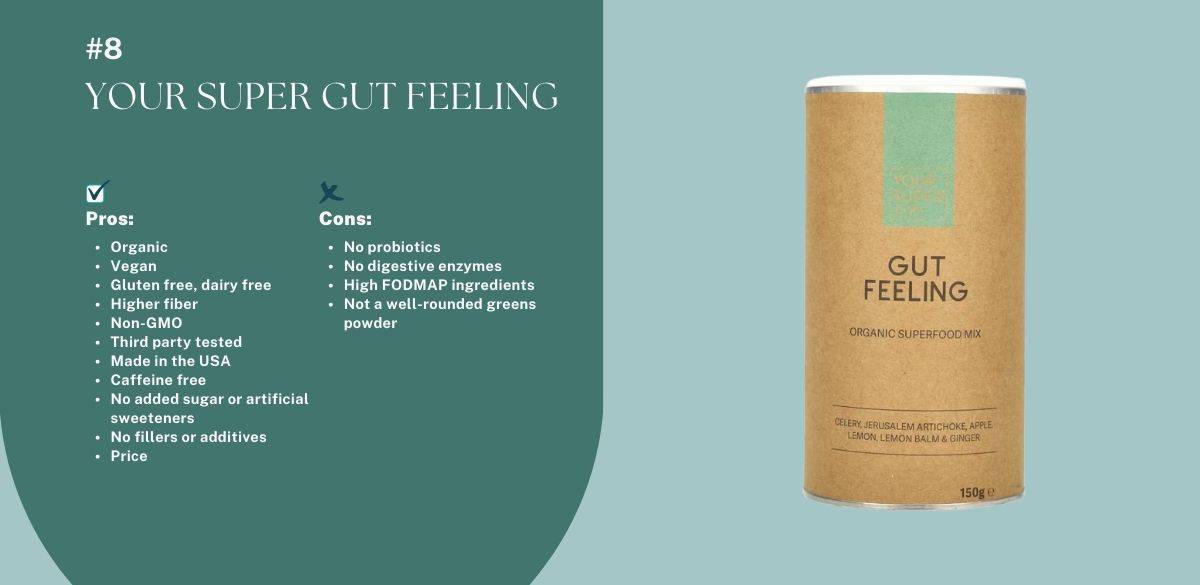
Gut Feeling is all about supporting your digestive health with just six ingredients. And while it does a commendable job on the prebiotic front, its almost singular focus leaves much to be desired.
Bloat-relieving ingredients
Prebiotics. Prebiotics are the fibers that feed the beneficial gut bacteria in our gut. Without enough prebiotics, our probiotics won’t thrive fully. The prebiotics in Gut Feeling include those from apple and Jerusalem artichokes.
The product is certified organic and also contains lemon and ginger.
Tough on the gut
While there are a few ingredients that may positively impact your gut bloating, Gut Feeling does not contain digestive enzymes, probiotics, or even a very well-rounded profile of greens, herbs, blue green algae, or grasses.
As with some of these other products, if you are sensitive to high-FODMAP fibers, such as the fructans found in Jerusalem artichokes, I recommend avoiding this greens powder.
With that said, Gut Feeling is also one of the least expensive—likely due to its minimalistic ingredients.
Pros
- Organic
- Vegan
- Gluten free, dairy free
- Higher fiber
- Non-GMO
- Third party tested
- Made in the USA
- Caffeine free
- No added sugar or artificial sweeteners
- No fillers or additives
- Price
Cons
- No probiotics
- No digestive enzymes
- High FODMAP ingredients
- Not a well-rounded greens powder
Overall: If you’re only looking for a few antioxidants within a boatload of prebiotic fibers to solve your digestive woes, then this is the right greens powder for bloating. But if you’d prefer a more versatile greens supplement that covers all your gut health bases including gut health, look at another product.
#9 Live Conscious Beyond Greens Blend
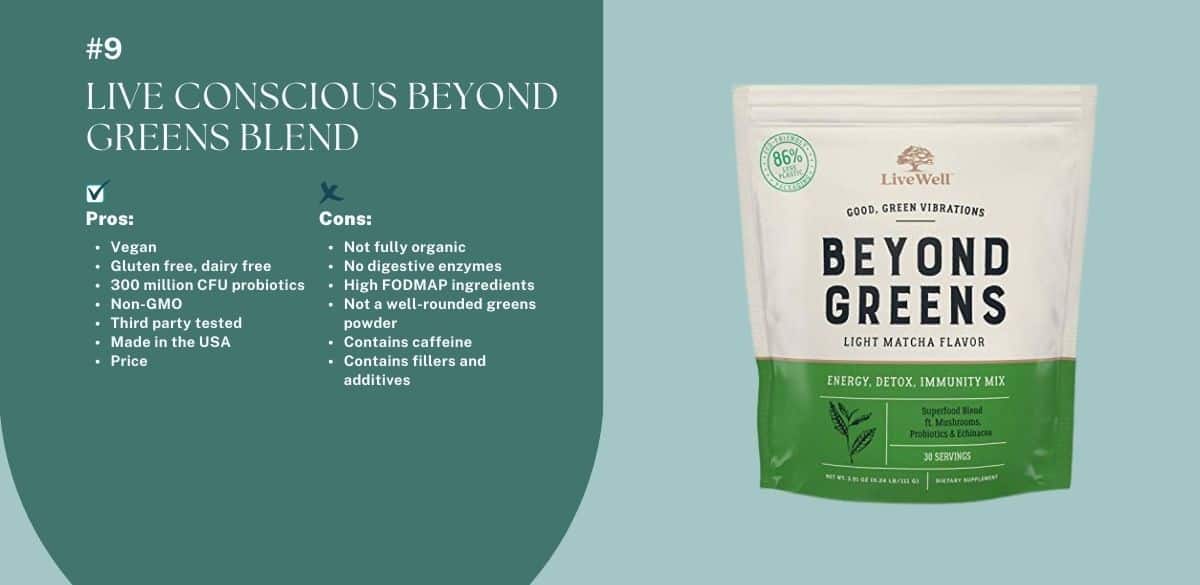
Beyond Greens Blend has 14 superfood ingredients, focusing on adaptogens, a couple herbs, and a bunch of prebiotic fibers. This greens powder advertises immune support, gut health, detoxification, and energy. Let's see if it lives up to its claim as a greens power for gut health.
Bloat-relieving ingredients
Ceylon Cinnamon. While studies have mostly been done on rats, cinnamon shows promising results for digestive health. This spice may help increase the amount and variety of healthy bacteria in our gut, as well as reduce inflammation there.
This greens powder also contains a nice array of adaptogenic mushrooms; matcha, a small dose of probiotics; and several prebiotic fibers, including FOS, tahl gum, and XOS (xylooligosaccharides).
Tough on the gut
Once again, we’re confronted with a greens powder for bloating that relies heavily on high FODMAP prebiotics. And I’ll repeat: for many people this may work, but it may also cause increased tummy trouble for others. There are also no digestive enzymes.
However, what truly brings Live Conscious’s product down on my list are the additives and fillers. Beyond Greens Blend contains xanthan gum as a filler and sodium copper chlorophyllin as a food colorant. Food additives have been shown to disturb our gut health, causing inflammation and an overgrowth of bad bacteria.
Additionally, Beyond Greens Blend includes xylitol as a natural sweetener. Xylitol is a naturally occurring sugar alcohol that pulls water into the intestines and causes extra gastrointestinal distress. More bloating! This is a high FODMAP ingredient.
Pros
- Vegan
- Gluten free, dairy free
- 300 million CFU probiotics
- Non-GMO
- Third party tested
- Made in the USA
- Price
Cons
- Not fully organic
- No digestive enzymes
- High FODMAP ingredients
- Not a well-rounded greens powder
- Contains caffeine
- Contains fillers and additives
Overall: For those who do well with prebiotics and would like an extra boost from adaptogenic mushrooms, this is a great product. However, I highly recommend steering clear of products that have added fillers and food additives.
#10 CIRA Glow-Getter Greens Superfood Powder
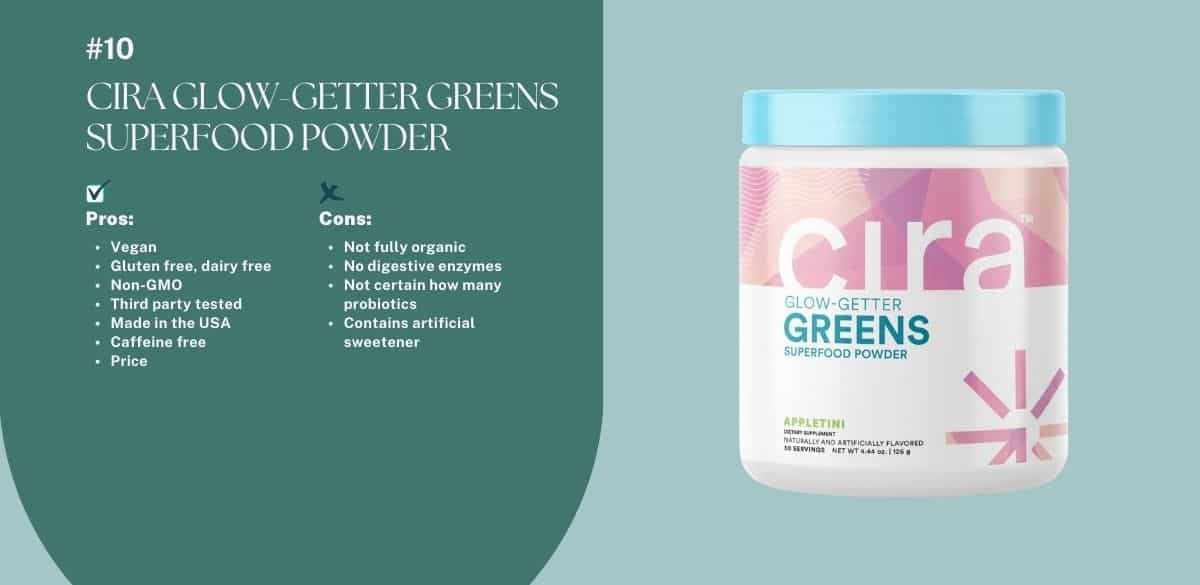
Glow-Getter Greens Superfood Powder is advertised to improve gut health, digestion, immunity, and energy. With less than 10 superfood ingredients, let’s see if this is a good greens powder for bloating.
Bloat-relieving ingredients
Probiotics. CIRA put six different strains of probiotics in their Glow-Getter Greens Superfood Powder. As long as the CFU is high enough, probiotics will help boost our gut health and reduce bloating by helping keep our microbiome thriving.
Tough on the gut
Unfortunately, this CIRA product does not contain digestive enzymes, nor do they tell us how many CFUs of probiotics are included in their greens powder. It also does not contain as many greens and herbs that may bolster our gut health and help keep bloating at bay.
Sadly, Glow-Better Greens contain sucralose. This artificial sweetener has been shown, as many others have, to reduce the effectiveness of our intestinal barrier against bad bacteria and may reduce the amount of beneficial bacteria.
Pros
- Vegan
- Gluten free, dairy free
- Non-GMO
- Third party tested
- Made in the USA
- Caffeine free
- Price
Cons
- Not fully organic
- No digestive enzymes
- Not certain how many probiotics
- Contains artificial sweetener
Overall: There are not many gut health-boosting ingredients, other than an unknown amount of probiotics, in Glow-Better Greens Superfood Powder. Additionally, this greens powder for bloating may not live up to its digestive health hype.
Top Health Benefits of Greens Powder for Bloating and Gut Health
Our days are packed and rushed, and it’s not always possible to eat a well-balanced diet with plenty of fruits and vegetables. Unfortunately, many of the convenient foods we reach for often lead to bloating and digestive discomforts.
Including a delicious, nutrient-packed greens powder, such as Ensō Supergreens, into your day is an easy way to help prevent bloating while also improving your overall health.
Here is a deeper look at greens powders health benefits for bloating and gut health.
Amplify your gut bacteria
Taking probiotics on a daily basis, particularly from a greens powder, is an important strategy for keeping your digestive system and overall health in check.
Research shows that consuming probiotics helps to bolster your microbiome, keep your intestinal barrier strong, influence your immune system, reduce inflammation, and help reduce bloating in the process.
Better digestion and nutrient absorption
Digestive enzymes are necessary to break down carbohydrates, protein, and fat. Without proper enzymes and subsequent digestion, the body can’t absorb nutrients from the food. Research has shown that digestive enzymes can be very beneficial for the cramping, bloating, and other digestive pains experienced after a meal.
Reduced bloat-causing inflammation
Most greens powders are packed with powerful antioxidants that help to reduce internal inflammation. Low-grade chronic inflammation in the gut can lead to bloating and other digestive pain. There are specific plants that work to help reduce inflammation in the digestive system specifically, including parsley, ginger, peppermint, and beetroot.
Feed your microbiome to keep it thriving
Diet is a key factor in keeping your beneficial gut microorganisms flourishing in order to improve your gut health. These bacteria feed on specific types of non-digestible carbohydrate fibers, called prebiotics, keeping them healthy and imparting more health benefits.
In fact, bacteria digest these prebiotic fibers into short chain fatty acids (SCFA), which are the primary source of energy for our intestinal cells. These cells absorb nutrients even better when they have enough SCFA. A greens powder containing prebiotic fibers is a boon for the health and efficiency of your digestive tract, as long as you can digest them well.
Improve overall gut health
A diet rich in plants is incredibly important for healthy digestion as a whole. Increasing your overall intake of green vegetables, grasses, blue green algae, herbs, roots, and fruit is the goal, and an easy way to do so is by consuming greens powders every day.
Key considerations for choosing a greens power for bloating
It can be daunting to figure out which greens powder for bloating may work best for you, and not all greens powders are created equally. As you consider all the options, here are some points to keep in mind.
Ingredients to look for
Since there are many ways to improve our gut health, choose a super greens powder powder that has multiple beneficial ingredients. The best green powders for bloating will include at least a few of the gut-benefiting plants, has abundant probiotics, includes digestive enzymes, and is an overall well-balanced greens supplement with a variety of grasses, greens, herbs, and microalgae.
Ingredients to avoid
There are specific items to avoid when searching out your perfect greens powder for bloating. Skip over products with fillers, additives, and artificial sweeteners, as these often cause more GI stress and bloating.
Note that natural sweeteners such as monk fruit and stevia, as well as vanilla bean powder, are usually GI-friendly, so these are safe to have in super greens powders.
Be aware of your own triggers. If you know that prebiotic fibers are just a recipe for tummy trouble, avoid greens powders with those as a main ingredient.
Choose organic
Pesticides and herbicides wreak havoc on our gastrointestinal tract. The chronic inflammation they cause may lead to more bloating and other digestive issues. Choosing an organic greens powder helps reduce your exposure to these chemicals, and ensures natural ingredients.
Taste
You can choose a seemingly perfect greens powder to reduce your bloat, but if you don’t like the taste all bets are off. Ensō Supergreens has a pleasant flavor—refreshing and not grassy—that goes along with all those gut-benefiting ingredients.
Add your green powder to a morning smoothie, either with liquid of choice or packed with other whole foods such as spinach, frozen blueberries, and avocado, for a boost of energy to start your day.
Final Thoughts
Ensō Supergreens is the clear winner after scouring the market for the best greens powder for bloating. This greens powder contains over 20 organic superfoods, several bloat-busting ingredients, 5 billion CFUs of probiotics, and digestive enzymes including pineapple and papaya (which have benefits unto themselves). Plus, no additives, fillers, or artificial sweeteners. An excellent choice for a healthy digestive system.
Remember that what works for someone else may not work for you. Give a greens powder at least 3 to 4 weeks for your gut to adjust to the ingredients and for you to ultimately understand if it’s helpful or just causes more issues.
Sources:
1. Sperber A, Bangdiwala S, Drossman D, et al. Worldwide prevalence and Burden of Functional Gastrointestinal Disorders, Results of Rome Foundation Global Study. Gastroenterology 2021; 160(1): 99-114. e3. doi:10.1053/j.gastro.2020.04.014
2. Farzaei MH, Abbasabadi Z, Ardekani MR, Rahimi R, Farzaei F. Parsley: a review of ethnopharmacology, phytochemistry and biological activities. J Tradit Chin Med. 2013;33(6):815-826. doi:10.1016/s0254-6272(14)60018-2
3. Wang, X., Zhang, D., Jiang, H., Zhang, S., Pang, X., Gao, S., Zhang, H., Zhang, S., Xiao, Q., Chen, L., Wang, S., Qi, D., & Li, Y. (2021). Gut Microbiota Variation With Short-Term Intake of Ginger Juice on Human Health. Frontiers in microbiology, 11, 576061. https://doi.org/10.3389/fmicb.2020.576061
4. Walsh C, Guinane C, O’Toole P, et al. Beneficial Modulation of the Gut Microbiotia. FEBS Letters. 2014; 588(22): 4120-4130. https://doi.org/10.1016/j.febslet.2014.03.035
5. Khanna R, MacDonald JK, Levesque BG. Peppermint oil for the treatment of irritable bowel syndrome: a systematic review and meta-analysis. J Clin Gastroenterol. 2014;48(6):505-512. doi:10.1097/MCG.0b013e3182a88357
6. NIH National Center for Complementary and Integrative Health. Probiotics: What you Need to Know. July 2019. Accessed 19 February 2023.
7. Laudisi, F., Stolfi, C., & Monteleone, G. (2019). Impact of Food Additives on Gut Homeostasis. Nutrients, 11(10), 2334. https://doi.org/10.3390/nu11102334
8. Giambò, F., Teodoro, M., Costa, C., & Fenga, C. (2021). Toxicology and Microbiota: How Do Pesticides Influence Gut Microbiota? A Review. International journal of environmental research and public health, 18(11), 5510. https://doi.org/10.3390/ijerph18115510
9. de Oliveira SPA, do Nascimento HMA, Sampaio KB, de Souza EL. A review on bioactive compounds of beet (Beta vulgaris L. subsp. vulgaris) with special emphasis on their beneficial effects on gut microbiota and gastrointestinal health. Crit Rev Food Sci Nutr. 2021;61(12):2022-2033. doi:10.1080/10408398.2020.1768510
10. Pérez-Burillo, S., Navajas-Porras, B., López-Maldonado, A., Hinojosa-Nogueira, D., Pastoriza, S., & Rufián-Henares, J. Á. (2021). Green Tea and Its Relation to Human Gut Microbiome. Molecules (Basel, Switzerland), 26(13), 3907. https://doi.org/10.3390/molecules26133907
11. Scazzocchio, B., Minghetti, L., & D'Archivio, M. (2020). Interaction between Gut Microbiota and Curcumin: A New Key of Understanding for the Health Effects of Curcumin. Nutrients, 12(9), 2499. https://doi.org/10.3390/nu12092499
12. Shimizu, C., Wakita, Y., Inoue, T., Hiramitsu, M., Okada, M., Mitani, Y., Segawa, S., Tsuchiya, Y., & Nabeshima, T. (2019). Effects of lifelong intake of lemon polyphenols on aging and intestinal microbiome in the senescence-accelerated mouse prone 1 (SAMP1). Scientific reports, 9(1), 3671. https://doi.org/10.1038/s41598-019-40253-x
13. Muss C, Mosgoeller W, Endler T. Papaya preparation (Caricol®) in digestive disorders. Neuro Endocrinol Lett. 2013;34(1):38-46.
14. Roxas M. The role of enzyme supplementation in digestive disorders. Altern Med Rev. 2008;13(4):307-314.
15. Markowiak, P., & Śliżewska, K. (2017). Effects of Probiotics, Prebiotics, and Synbiotics on Human Health. Nutrients, 9(9), 1021. https://doi.org/10.3390/nu9091021
16. O'Connor, K., Morrissette, M., Strandwitz, P., Ghiglieri, M., Caboni, M., Liu, H., Khoo, C., D'Onofrio, A., & Lewis, K. (2019). Cranberry extracts promote growth of Bacteroidaceae and decrease abundance of Enterobacteriaceae in a human gut simulator model. PloS one, 14(11), e0224836. https://doi.org/10.1371/journal.pone.0224836
17. Jayachandran, M., Xiao, J., & Xu, B. (2017). A Critical Review on Health Promoting Benefits of Edible Mushrooms through Gut Microbiota. International journal of molecular sciences, 18(9), 1934. https://doi.org/10.3390/ijms18091934
18. Cladis, D. P., , Simpson, A. M. R., , Cooper, K. J., , Nakatsu, C. H., , Ferruzzi, M. G., , & Weaver, C. M., (2021). Blueberry polyphenols alter gut microbiota & phenolic metabolism in rats. Food & function, 12(6), 2442–2456. https://doi.org/10.1039/d0fo03457f
19. Raveendra, K. R., Jayachandra, Srinivasa, V., Sushma, K. R., Allan, et al. An Extract of Glycyrrhiza glabra (GutGard) Alleviates Symptoms of Functional Dyspepsia: A Randomized, Double-Blind, Placebo-Controlled Study. Evidence-based complementary and alternative medicine : eCAM, 2012, 216970. https://doi.org/10.1155/2012/216970
20. Jaśniewska, A., & Diowksz, A. (2021). Wide Spectrum of Active Compounds in Sea Buckthorn (Hippophae rhamnoides) for Disease Prevention and Food Production. Antioxidants (Basel, Switzerland), 10(8), 1279. https://doi.org/10.3390/antiox10081279
21. Li AL, Ni WW, Zhang QM, et al. Effect of cinnamon essential oil on gut microbiota in the mouse model of dextran sodium sulfate-induced colitis. Microbiol Immunol. 2020;64(1):23-32. doi:10.1111/1348-0421.12749
22. Qui L, Mao H, Lu X, et al. Cinnamaldehyde Promotes the Intestinal Barrier Functions and Reshapes Gut Microbiome in Early Weaned Rats. Front Nutr 2021; (8). https://doi.org/10.3389/fnut.2021.748503
23. Laudisi, F., Stolfi, C., & Monteleone, G. (2019). Impact of Food Additives on Gut Homeostasis. Nutrients, 11(10), 2334. https://doi.org/10.3390/nu11102334
24. Zheng Z, Xiao Y, Ma L. et al. Low Dose of Sucralose Alter Gut Microbiome in Mice. Front Nutr 2022. 9. https://doi.org/10.3389/fnut.2022.848392
25. Wang, X., Zhang, P., & Zhang, X. (2021). Probiotics Regulate Gut Microbiota: An Effective Method to Improve Immunity. Molecules (Basel, Switzerland), 26(19), 6076. https://doi.org/10.3390/molecules26196076
26. Graham, D. Y., Ketwaroo, G. A., Money, M. E., & Opekun, A. R. (2018). Enzyme therapy for functional bowel disease-like post-prandial distress. Journal of digestive diseases, 19(11), 650–656. https://doi.org/10.1111/1751-2980.12655
27. Akiho, H., Ihara, E., & Nakamura, K. (2010). Low-grade inflammation plays a pivotal role in gastrointestinal dysfunction in irritable bowel syndrome. World journal of gastrointestinal pathophysiology, 1(3), 97–105. https://doi.org/10.4291/wjgp.v1.i3.97
28. Holscher H. D. (2017). Dietary fiber and prebiotics and the gastrointestinal microbiota. Gut microbes, 8(2), 172–184. https://doi.org/10.1080/19490976.2017.1290756
29. Tomova, A., Bukovsky, I., Rembert, E., Yonas, W., Alwarith, J., Barnard, N. D., & Kahleova, H. (2019). The Effects of Vegetarian and Vegan Diets on Gut Microbiota. Frontiers in nutrition, 6, 47. https://doi.org/10.3389/fnut.2019.00047


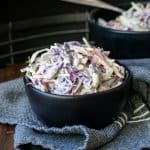










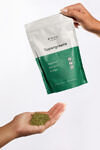
Questions or comments? Let me know below!